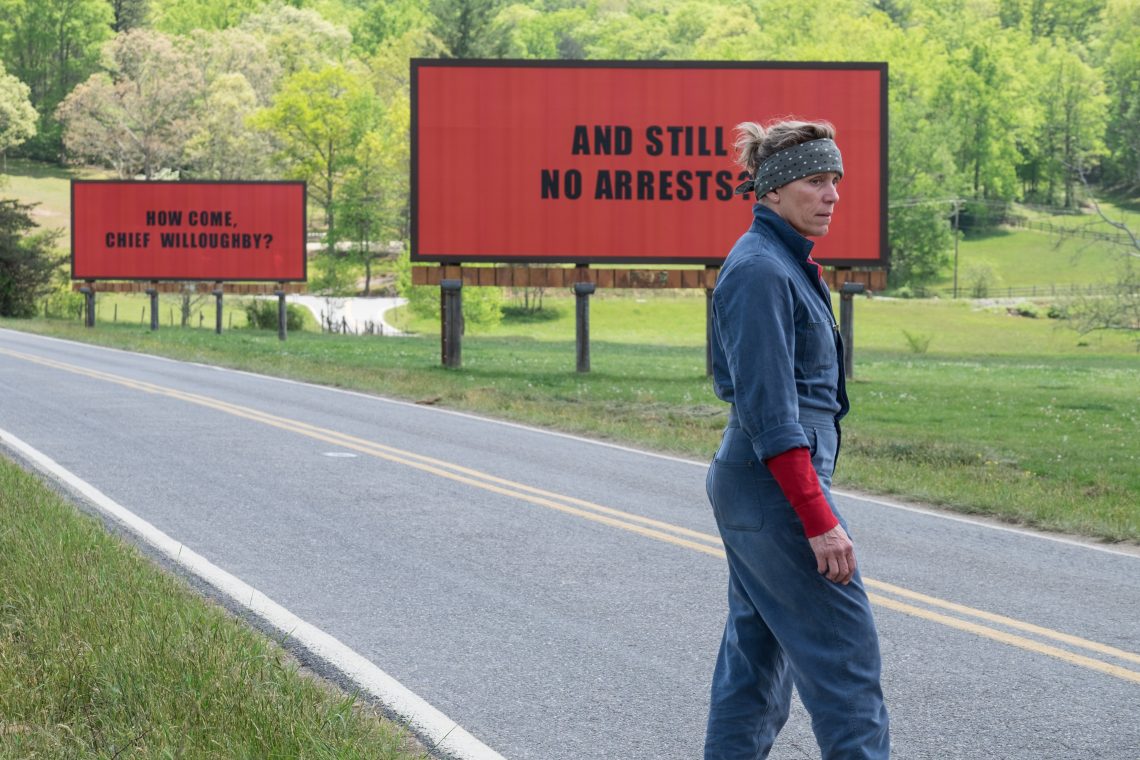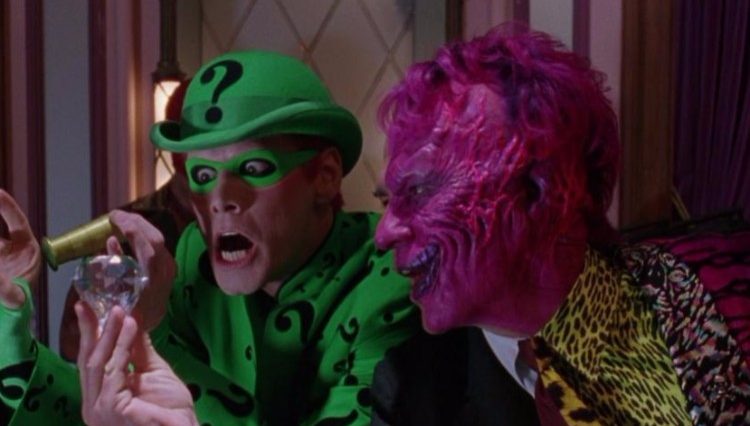 Written and directed by one of my favorite British writers, Martin McDonagh, Three Billboards Outside Ebbing, Missouri is a simple tale of Mildred, played by Frances McDormand (who I’ll get to shortly) personally challenging the police department responsible for “investigating” the rape/murder of her Daughter by hiring three billboards just outside the town of Ebbing, Missouri. Draped over these billboards read three simple, but severe, messages, each showing her more than apparent disillusionment toward the town’s Police Department. Aptly titled “The Billboards of Wrath” in French cinemas, Three Billboards is an investigation into the desperation of a parent whose need for answers is circumvented by the bureaucratic monotony of the town’s local Police, led in earnest by Woody Harrelson’s tragic Bill Willoughby (again, we’ll get to it). At a glance, it certainly appears compelling enough to carry a film on this story alone, however, combine Sam Rockwell’s performance as the tempestuous Officer Dixon (a performance that is gaining monumental traction amongst critics and audiences alike) and you have a movie that slowly burns at a pace perfect for what it needs.
Written and directed by one of my favorite British writers, Martin McDonagh, Three Billboards Outside Ebbing, Missouri is a simple tale of Mildred, played by Frances McDormand (who I’ll get to shortly) personally challenging the police department responsible for “investigating” the rape/murder of her Daughter by hiring three billboards just outside the town of Ebbing, Missouri. Draped over these billboards read three simple, but severe, messages, each showing her more than apparent disillusionment toward the town’s Police Department. Aptly titled “The Billboards of Wrath” in French cinemas, Three Billboards is an investigation into the desperation of a parent whose need for answers is circumvented by the bureaucratic monotony of the town’s local Police, led in earnest by Woody Harrelson’s tragic Bill Willoughby (again, we’ll get to it). At a glance, it certainly appears compelling enough to carry a film on this story alone, however, combine Sam Rockwell’s performance as the tempestuous Officer Dixon (a performance that is gaining monumental traction amongst critics and audiences alike) and you have a movie that slowly burns at a pace perfect for what it needs.

“My daughter Angela was murdered 7 months ago. It seems to me the police department is too busy torturing black folk to solve actual crimes.”
For those that may not know of Martin McDonagh, I highly recommend watching In Bruges as soon as you can, his style will instantly jump off the screen and sit firmly with you for a very long time. The way he entwines comedy with grim, desolate themes is hilarious without ever stepping too far over the line. This is no further identified than Frances McDormand’s Mildred Hayes. A beleaguered mother whose passion to avenge the death of her daughter outweighs the neglect she shows her son, the repulsion she has for her abusive ex-husband and the consideration she should be showing to characters we are steeled to dislike. However, her wit and comedic delivery are some of the funniest moments I’ve seen in a film for a very long time. Her ability to run hot and cold is the most blatant testament to McDormand’s skill as an actor you can ever see. The way in which she progressively passes from vulnerability to strength is sure to hold your attention, especially considering the number of times these switches occur throughout the film.

Photo by Merrick Morton. © 2017 Twentieth Century Fox Film Corporation All Rights Reserved
I’m sure I’ve said in every review I’ve written so far, however, I insist that without compelling, intriguing characters, a film will undoubtedly suffer. What made Three Billboards stand out for me was the position each character found themselves in at the end of act three. At the beginning, Mildred was an embittered, resentful figure whose sole ambition was to punish the lackluster Police Department for failing to apprehend her daughter’s assailant. Willoughby, Chief of Police and terminal Cancer patient, finds himself torn between the wrath of an obviously distressed citizen and the duty he holds to everyone else within his jurisdiction. Dixon, an aspiring Detective, and unrepentant mommy’s boy, in no way, hides his growing rage and despair towards the resident’s lack of respect shown towards him as well as enforces the idea that his previous act of torturing a black prisoner for information was necessary to complete his civic duty. Each character spends the majority of Three Billboards petering towards an eventual conclusion to their respective arc. Some do so by more poignant means (Harrelson, in particular, brought me closer to tears than I had ever expected), others with a greater flair and power that shakes what residual emotion you have to its deepest of cores.
Three Billboards Outside Ebbing, Missouri is like no film I’ve seen before. If I were to make a tentative comparison, I would classify it as a hybrid of such great films as In Bruges, Falling Down and Fargo. The eroding pace in which the action manifests itself is both stunning and unsettling. The grey area you inhabit throughout will raise question after question regarding the moral stability of not only the characters but potentially yourself too. Its inclusion of such an unforgivably funny script results in a story that shows no signs of remorse; and even less consideration for the emotional stability of those of us watching. The depth, desire, and despair on display from all involved leaves little to the imagination making it easy to see why audiences at the Toronto International Film Festival voted it their favorite film of the entire event. This rapturous experience is unafraid to investigate the increasing dissolution between class, sex, and community. Its emphasis, energy, and enthusiasm will not fail to leave you reeling from scene A to scene Z.



